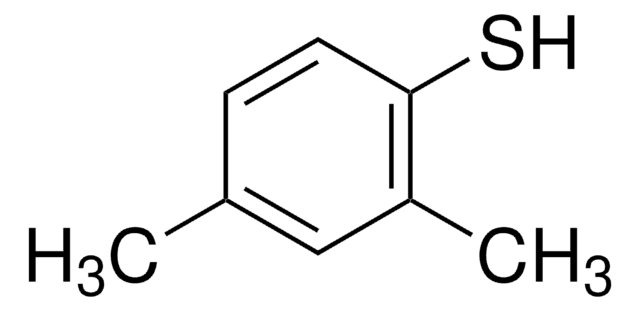252581
2-Phenylethanethiol
98%
Synonym(s):
2-Phenylethyl mercaptan, Phenethyl mercaptan
About This Item
Recommended Products
Assay
98%
refractive index
n20/D 1.560 (lit.)
bp
217-218 °C (lit.)
density
1.032 g/mL at 25 °C (lit.)
SMILES string
SCCc1ccccc1
InChI
1S/C8H10S/c9-7-6-8-4-2-1-3-5-8/h1-5,9H,6-7H2
InChI key
ZMRFRBHYXOQLDK-UHFFFAOYSA-N
Looking for similar products? Visit Product Comparison Guide
Related Categories
General description
Application
- in preparation of biicosahedral Au (25) clusters protected with various types of thiol ligands
- as derivatization reagent for phosphorylated sequences of peptides, for enhancing ionization efficiency in matrix-assisted laser desorption/ionization mass spectrometry
Storage Class Code
10 - Combustible liquids
WGK
WGK 3
Flash Point(F)
194.0 °F - closed cup
Flash Point(C)
90 °C - closed cup
Personal Protective Equipment
Certificates of Analysis (COA)
Search for Certificates of Analysis (COA) by entering the products Lot/Batch Number. Lot and Batch Numbers can be found on a product’s label following the words ‘Lot’ or ‘Batch’.
Already Own This Product?
Find documentation for the products that you have recently purchased in the Document Library.
Customers Also Viewed
Our team of scientists has experience in all areas of research including Life Science, Material Science, Chemical Synthesis, Chromatography, Analytical and many others.
Contact Technical Service













